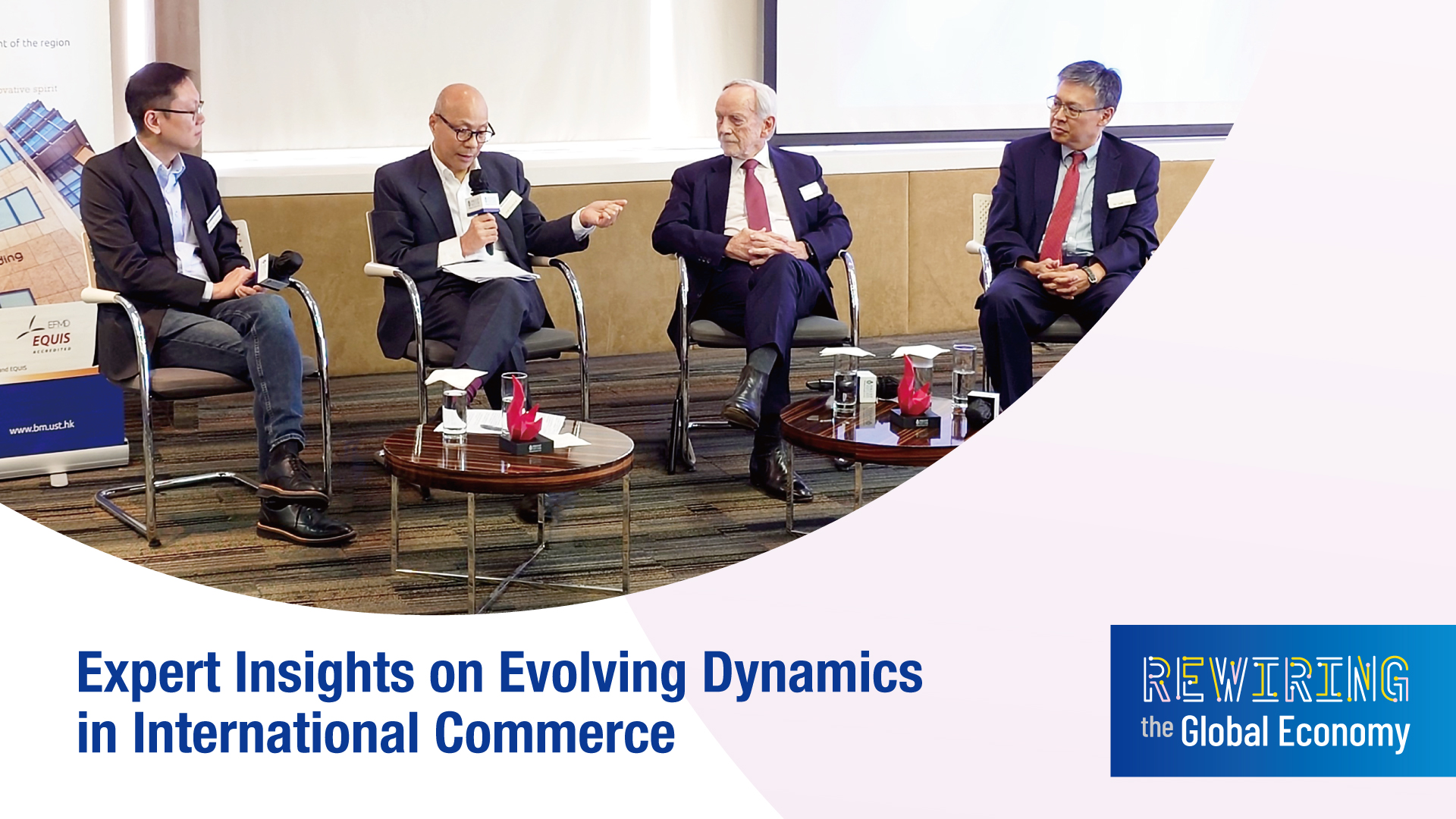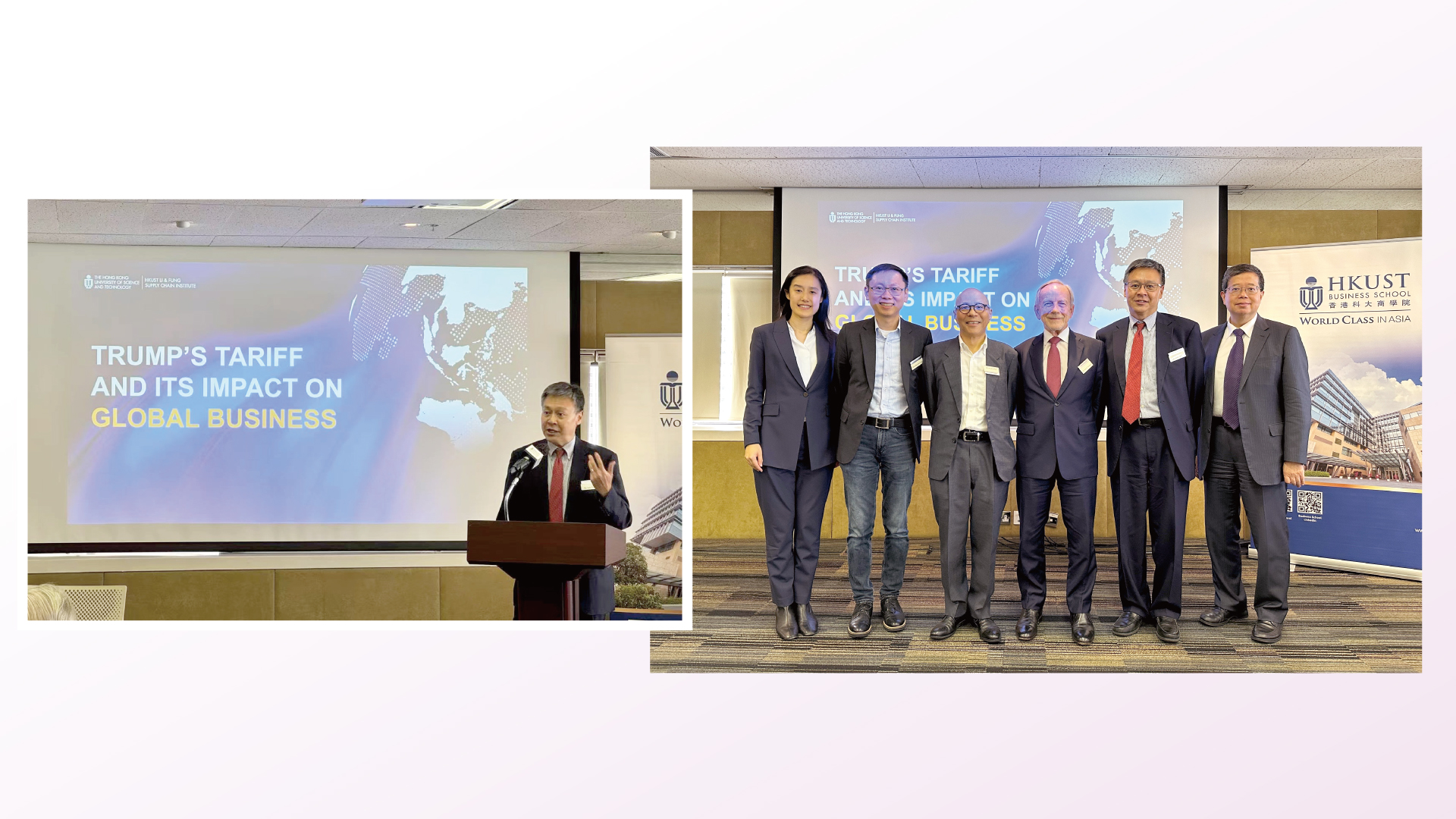
At a recent HKUST seminar, experts from business and academia explored the unraveling of globalization, US tariffs, China’s opportunities, and Hong Kong’s adaptability. Their insights focused on fostering resilience and preparing future generations for a transformed trade landscape.
In a time of unprecedented economic upheaval, the HKUST Li & Fung Supply Chain Institute hosted a seminar on “Trump’s Tariffs and their Impact on Global Business” bringing together leading voices in global trade, economics, and logistics to address the seismic shifts reshaping globalization and international commerce.
Moderated by Professor HUI Kai-Lung, Acting Dean of the HKUST Business School, the seminar featured heavyweights from the industry and academia including Andy TUNG, Managing Partner of QBN Capital and Non-Executive Director of Orient Overseas (International), Dr James THOMPSON, Chairman of Crown Worldwide, and Professor Edwin LAI, Professor Emeritus, from the HKUST Business School Department of Economics. Together, the speakers offered a riveting exploration of the implications of the US’s new tariffs, the opportunities and challenges for China and Hong Kong, and the future of global trade.
The event examined various perspectives on US trade policies and China’s evolving economic role, offering a comprehensive roadmap for navigating the new economic landscape.
The End of Globalization
Tung opened the seminar with a bold and thought- provoking statement: “Globalization as we knew it is probably over.” With the multilateral trading system meticulously constructed by the US after World War II now being dismantled by its own architect, Tung argued that the world is witnessing the end of an era.
“This doesn’t mean we’re going to rapidly de- globalize,” he explained. “It is difficult to do that. But the growth rate of globalization will certainly not be what it was before.”
He illustrated his point with stark statistics: where container volume once grew three times faster than GDP, it now grows at nearly the same rate. “Every hour, there’s something new happening,” Tung said, capturing the dizzying unpredictability of current trade dynamics.
Ominously, Tung also warned of a fractured future for global trade, where political considerations increasingly overshadow economic efficiency. “Business decisions will no longer be made solely based on economic factors,” he said. “Every cross-border issue will now require navigating complicated political angles.” Investors are already responding to these shifts, with some becoming hesitant to engage with funds from Hong Kong or Mainland China.
“It’s becoming an odd place to be,” Tung said.
Contradictions and Consequences
The panel discussion then sought to dissect the motivations and contradictions behind the new US tariffs. Professor Lai provided a sharp analysis, summarizing the four main goals of the policies: “President Trump wants to generate revenue, reduce the trade deficit, bring major manufacturing back to the US, and possibly use tariffs as a threat to negotiate more market opening. However, these aims are not mutually consistent. Some are actually contradictory.”
Lai also introduced the concept of the optimum tariff theory, explaining that a large country might gain revenue by imposing tariffs if foreign nations do not retaliate. “But in reality, the retaliations have been swift,” he said.
He expressed scepticism about the feasibility of some of the US’s goals. “As for bringing manufacturing back to the US, I very much doubt it,” he said. “Reducing the current account deficit? Maybe, but at the cost of inflation and increased costs to American manufacturing.”
Thompson described the current strategy as fundamentally flawed, as it overlooks the overall impact. “Look at the major big-box retailers like Walmart or Target,” he said. “Very few items are made in the US. The new tariff policy fails to account for the broader implications.”
He also predicted an eventual consumer backlash. “Anyone who buys under these tariff markups is definitely going to pay a lot more,” he said. “It will take time, but consumers will ask, ‘Why am I paying all this extra money?’”
China’s Opportunity
While the US tariffs have created challenges, the panelists still saw significant possibilities for China to reshape its economic strategy. “China can turn this crisis into an opportunity,” Lai said. “The nation’s consumption as a percentage of GDP is too low — maybe 50-55%, compared to the US at almost 70%.” By boosting domestic consumption, China could reduce its reliance on exports and build greater resilience against external shocks.
He also highlighted China’s broader economic potential. “Measured by purchasing power parity, Chinese GDP is actually 25% larger than that of the US.”
Thompson praised the speed of China’s evolution from low-cost manufacturing to high-value exports. “The country has gone from toys and T-shirt to electronics and iPhones. Their exports have become much more sophisticated,” he said.
Agreeing with this, Lai further emphasized the fact of resilience in the face of adversity. “China is very good at ‘eating bitterness’,” he said, alluding to the country’s ability to endure and adapt to economic challenges.
Hong Kong’s Future Role
The discussion also considered Hong Kong’s position in this evolving landscape, highlighting the city’s well-known ability to adapt to changing circumstances and find new ways to prosper.
In particular, Thompson emphasized that Hong Kong’s strengths in logistics and finance could help it remain relevant despite the challenges posed by the trade war.
Tung echoed this sentiment, pointing to the importance of action and reaction for businesses in every sector. “Build a financial war chest, be efficient, and be adaptable,” he said. “Continue to cultivate relationships abroad and prepare for shrinking demand in traditional markets.”
Opportunities for Graduates
In response to a question from the audience about preparing future generations for this new economic reality, the panelists offered thoughtful and practical advice.
“China focuses on infrastructure and education,” Tung said, noting too the shift in global priorities towards tech-based industries. “These are the fundamental raw ingredients that have to be there. Interest in manufacturing has declined in the US, which is much more focused on design, innovation, and the next big thing.”
In turn, Thompson drew attention to the importance of both adaptability and global awareness. “Universities should focus on strengthening English skills and learning about global cultures,” he said. “International programs are key pathways for young professionals.”
Lai also highlighted the opportunities created by China’s increasing domestic consumption. “Instead of exporting to the US, other countries will now export more to Mainland China, and that demand seems certain to increase,” he said.
In this respect, Professor Hui, the Acting Dean, pointed out that the university is fully committed to preparing students for global careers, noting that “over 90% of our undergraduates have overseas experience.”
The Global Trade Chessboard
The panelists also spoke about the geopolitical implications of the trade war, with the consensus view being that China has so far adopted a strategic and measured response. Lai characterized this as: “Whatever you do to me, I will do the same, but I’m willing to negotiate.”
This approach could be seen as pragmatic and focused on long-term goals, in apparent contrast to the current US approach where its extensive influence should be balanced with broader international cooperation.
“The US is removing itself from being the global leader and this is a huge change in international relations,” Lai said.
At a time when the international economic order is being rewritten, Tung noted that “the future belongs to those who can adapt to the new rules of global trade.”

Andy TUNG, Managing Partner of QBN Capital and Non-Executive Director of Orient Overseas (International) (second right), Dr James THOMPSON, Chairman of Crown Worldwide (third right), Professor Emeritus Edwin LAI of the HKUST Department of Economics (third left), with moderator Professor HUI Kai-Lung, Acting Dean of HKUST Business School (second left), and CHANG Ka Mun, Executive Director of the HKUST Li & Fung Supply Chain Institute (first right), and Wendy WENG, the institute’s Manager (first left).



